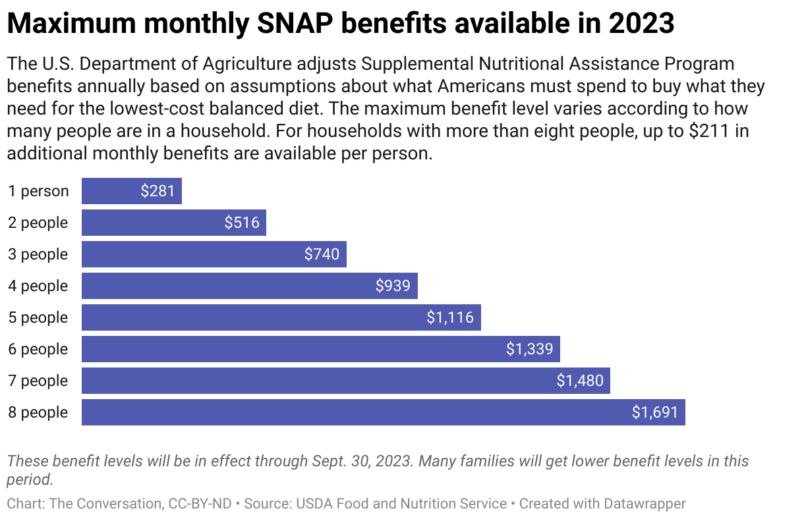This article is part of TPM Cafe, TPM’s home for opinion and news analysis. It was originally published at The Conversation.
The House of Representatives has passed a bill that would cut spending, in part by expanding work requirements for the Supplemental Nutrition Assistance Program, through which nearly 43 million low-income Americans get help buying groceries. The House bill calls for this policy to apply to adults as old as 55, while today this policy only applies to adults under 50. Some Democrats, in contrast, are seeking to eliminate work requirements altogether.
The bill passed by a 217-215 vote, with all but four Republicans in favor and every Democrat opposed, on April 26, 2023. Tied to a standoff over raising the debt ceiling, the bill would also make Medicaid – the U.S. program that helps low-income and disabled people get health care – contingent on work requirements for some eligible Americans. It’s not clear whether that’s possible, since a federal court has struck down similar measures enacted in some states previously.
Since the Clinton administration, the government has required that at least some people getting SNAP, commonly known as food stamps, do paid work, get job training or volunteer – otherwise they can’t continue receiving benefits. Those requirements were paused in 2020 because of the COVID-19 pandemic. They are set to return in July 2023 regardless of the fate of the House bill – which is unlikely to pass in the Democratic-controlled Senate.
I’m a member of a team of economists studying the social safety net and work. Because the rationale for work requirements is that they encourage adults who are able to work to earn more money and become more economically self-sufficient, we wanted to determine whether this policy boosts employment and earnings. We also looked into whether SNAP work requirements lead low-income adults to lose their benefits.
We found that the policy doesn’t make people more likely to find a job or make more money, but it does make Americans who could use help buying groceries less likely to get it.

Tracing a similar case study
Adults with SNAP benefits who are subject to work requirements must document at least 80 hours per month of paid work, job training or volunteering. Otherwise, they can get the benefits for only three months within a three-year period.
Before the pandemic, these rules applied to most so-called “able-bodied” adults without children who were under 50, and that policy will again apply in July. There are some exceptions, such as if the person with benefits is caring for kids younger than 6, has disabilities incompatible with holding a steady job or is in a drug or alcohol rehabilitation program.
To determine this policy’s impact, we studied SNAP, employment and earnings data in Virginia from both the period of the state’s previous suspension of work requirements and afterward.
Virginia, like many other states, suspended work requirements for several years beginning in the Great Recession. During this period, adults could enroll in the program and continue to receive benefits regardless of their employment status.
In October 2013, however, Virginia reinstated work requirements, and they remained in effect in most counties for several years. In those areas, adults under the age of 50 without dependents who were considered able to work needed to either satisfy work requirements or receive an individual exemption to keep their SNAP benefits, while similar adults over the age of 50 did not.
We followed both age groups over time, comparing whether they worked and were getting SNAP benefits both before and after work requirements returned.
No employment boost
By comparing older and younger adults previously getting SNAP benefits, we found that work requirements did not increase employment or earnings 18 months after their reinstatement.
We also detected nearly identical patterns of employment before and after work requirements were reinstated for people in both age groups.
Adults without dependents, whether or not they lost their SNAP benefits to the resumption of work requirements, were earning at most an additional US$28 per month.
Many lost their benefits
But we did find that work requirements dramatically reduced the number of people enrolled in SNAP. Among the adults subject to work requirements once they were restored in 2013, over half lost their benefits because of the policy.
We also found that work requirements disproportionately led people who had faced great economic hardships, such as those without housing or earned income, to lose benefits.
Only 44% of the currently or formerly homeless people getting benefits remained enrolled in SNAP 18 months after work requirements were reinstated, compared with 64% of everyone else, our estimates suggest. Similarly, only 59% of those with no earned income remained enrolled, relative to 73% of those with prior earnings.
Because they are likely to qualify for an individual exemption to work requirements, adults with a history of a disability were more likely to retain benefits compared with others.
Adults kicked out of SNAP because of work requirements typically stood to lose $189 in benefits per month – the most a single person could obtain at the time. It also amounted to about two-thirds of their gross income.
We studied work requirements in Virginia because of the availability of detailed data on both earnings and SNAP benefits.
Although work requirements enforcement varies across states, we believe that our results are likely to be representative of the impacts of this policy, since SNAP recipients in Virginia look similar to nationwide averages on most demographic characteristics except race.

Our findings do suggest that work requirements restrain federal spending by reducing the number of people getting SNAP benefits.
But our work also indicates that in today’s context, these savings would be at the expense of already vulnerable people facing additional economic hardship at a time when a new recession could be around the corner.
This article is republished from The Conversation under a Creative Commons license. Read the original article.







The “work requirements” pushed by the Republican Party do not function as they claim, but Republicans already know that, they are not that stupid. But it does highlight the complete and absolute hypocrisy of the Republican position. They claim to be a party of god, but enact policies that hurt people - even their own base. The leadership has learned over the decades how to lie and distort reality in a convincing way to sell to their base the belief that “others are getting things they are not”, where others is code for non-white people. Consequently, they have found how to have their base vote against their own best interests. Politics at its worst. Why should anyone any longer think otherwise? The goal appears simply not to get people to work for a benefit. It is to punish them and put up additional barriers.
Just look at their policies and their speaking mouths (FOX, etc.). Can anyone honestly give one recent example (recent being in the past 40 years) where Republicans have actually done something for the betterment of all people in the Nation? They just want to split people into warring camps - the divide and conquer approach, and it is working. Demographics are working against them, and they know it, so they will go down fighting (and hurting others). That is how the far Right got started in a serious way. They have always been there, but they knew they needed to keep quiet as other moderate Republicans made sure they didn’t disrupt their efforts. Now, that has failed as there are no longer such things as moderate Republicans. They allowed Trump and the Republican radical right to lead.
Just add SNAP work requirements to their long and lengthy list of national policy failures.
The short version of the conclusion to draw here is that the GOP doesn’t want poor, hungry people to work so much as they want them to starve. The cruelty is the point.
A job is a special subset of work that puts money into someone else’s wallet. Rightists are merely the someone else, into whose wallets they want SNAP recipients’ work to put money.
This is why they are so anxious for everyone or other to get a job, and also why the tons of work people do every day, which is not a job because it doesn’t put money in a rightist’s wallet, doesn’t count in the rightists’ book.
The rightist’s lament that nobody wants to work, really means nobody wants the crappy jobs they have on offer.
Good diet is critical to longevity and health. Even SNAP does not guarantee a healthy diet, it is merely aspirational. The Dietary Guidelines for Americans codify the current nutritional direction consumers are expected to follow. If you go to the store, or different stores, you will see from the shopping carts that nutritional approaches are all over the map. The more wealthy and better-educated you are, the more nutritionally aware you are – generally speaking. “Precision nutrition”, optimized diet for the person, is the current goal. Indeed, making it harder to get food that is not good for you might be a benefit. Right now SNAP disallows hot foods and some impulse items at point of sale. Most snack foods, including pop-tarts and fritos, are covered.
What “conservatives” might call a win - win.